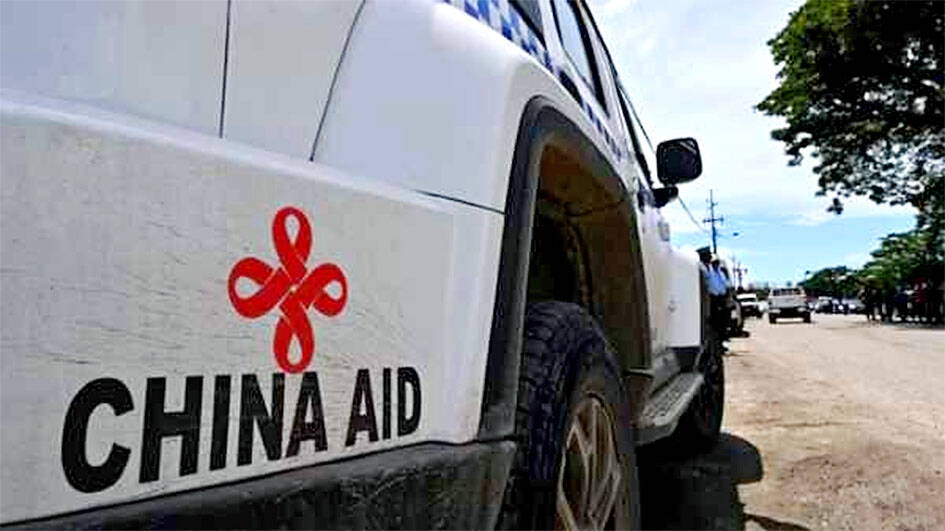China has renewed efforts to curry favor in Pacific island nations, a new report found on Wednesday, after charting a “resurgence” in Beijing-backed aid and infrastructure funding.
Over the past decade, China has lavished billions of dollars on Pacific island nations, part of ongoing efforts to build influence in competition with the US and its allies.
Having cut back on Pacific aid at the height of the COVID-19 pandemic, China’s commitments have climbed in recent years, the Lowy Institute said in a new study.

Photo: AFP
“Beijing has emerged from a pandemic-induced lull with a more competitive, politically targeted model of aid engagement,” the Australia-based think tank said in its annual Pacific aid report.
“The uptick in Chinese spending has been accompanied by a resurgence in new Chinese project commitments, signaling a revival in its ambition to engage in major infrastructure works in the Pacific,” it said.
Australia — traditionally the Pacific’s partner of choice — remained the largest donor, but US funding now narrowly trails that of China, the second-largest bilateral donor in the region, authors Alexandre Dayant and Riley Duke said.
In 2022, the most recent year with complete data, China spent $256 million — up nearly 14 percent from three years earlier.
Australia spent US$1.5 billion, and the US spent $249 million — both figures falling after a sharp increase the previous year.
There had been a noticeable shift in the way China engages throughout the region, the report said.
Instead of splashing cash in a broad-brush approach, Beijing was increasingly zeroing in on a handful of friendly Pacific Island states.
Solomon Islands and Kiribati were singled out for school upgrades, new roads and government vehicles after severing diplomatic links with Taiwan in 2019.
Papua New Guinea, which signed a security agreement with the US last year, saw development funding from China dwindle.

THE TRAGEDY OF PUNCH: Footage of the seven-month-old Japanese macaque has gone viral online after he was rejected by his mother and formed a bond with a soft toy A baby monkey in Japan has captured hearts around the world after videos of him being bullied by other monkeys and rejected by his mother went viral last week. Punch, a Japanese macaque, was born in July last year at Ichikawa City Zoo. He has drawn international attention after zookeepers gave him a stuffed orangutan toy after he was abandoned by his mother. Without maternal guidance to help him integrate, Punch has turned to the toy for comfort. He has been filmed multiple times being dragged and chased by older Japanese macaques inside the enclosure. Early clips showed him wandering alone with

South Korea would soon no longer be one of the few countries where Google Maps does not work properly, after its security-conscious government reversed a two-decade stance to approve the export of high-precision map data to overseas servers. The approval was made “on the condition that strict security requirements are met,” the South Korean Ministry of Land, Infrastructure and Transport said. Those conditions include blurring military and other sensitive security-related facilities, as well as restricting longitude and latitude coordinates for South Korean territory on products such as Google Maps and Google Earth, it said. The decision is expected to hurt Naver and Kakao

Australian Prime Minister Anthony Albanese yesterday said he did not take his security for granted, after he was evacuated from his residence for several hours following a bomb threat sent to a Chinese dance group. Albanese was evacuated from his Canberra residence late on Tuesday following the threat, and returned a few hours later after nothing suspicious was found. The bomb scare was among several e-mails threatening Albanese sent to a representative of Shen Yun, a classical Chinese dance troupe banned in China that is due to perform in Australia this month, a spokesperson for the group said in a statement. The e-mail

TENSIONS: The march went ahead without clashes, but arrests were still possible as police investigate suspects behind Nazi salutes, racist slurs and homophobic insults Thousands of people on Saturday marched in southeastern France under heavy security in tribute to a far-right activist whose killing, blamed on the hard left, has put the country on edge. The crowd — many wearing black and some covering their lower faces with masks — marched through the city of Lyon carrying flowers and placards bearing pictures of Quentin Deranque and the words: “justice for Quentin” and “the extreme left kills.” The 23-year-old died from head injuries following clashes between radical left and far-right supporters on the sidelines of a demonstration against a politician from the left-wing France Unbowed